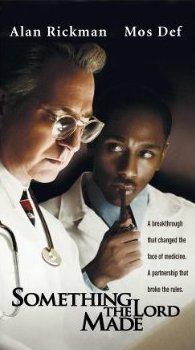Something the Lord Made
Something the Lord Made is a 2004 American made-for-television biographical drama film directed by Joseph Sargent. The film stars Alan Rickman as Alfred Blalock, a white surgeon, and Mos Def (credited as Yasiin Bey) as Vivien Thomas, a black surgical technician. The film is based on the true story of the two men's partnership and their groundbreaking achievements in the field of heart surgery, particularly in the development of a procedure to treat blue baby syndrome in the 1940s.
Plot[edit | edit source]
The film follows the complex relationship between Blalock, a prominent surgeon at Johns Hopkins Hospital, and Thomas, a skilled carpenter turned lab technician who aspires to be a doctor. Despite the racial prejudices of the time, Blalock recognizes Thomas's extraordinary talents and the two form a partnership. Together, they tackle the challenge of blue baby syndrome, a condition that leaves infants struggling for oxygen due to a heart defect. Their work leads to the development of the Blalock-Taussig shunt, a surgical procedure that saves the lives of many children and marks a significant advancement in cardiac surgery.
Cast[edit | edit source]
- Alan Rickman as Dr. Alfred Blalock
- Mos Def as Vivien Thomas
- Kyra Sedgwick as Mary Blalock
- Gabrielle Union as Clara Thomas
- Merritt Wever as Mrs. Saxon
- Clayton LeBouef as Harold Thomas
Production[edit | edit source]
The screenplay for Something the Lord Made was written by Peter Silverman and Robert Caswell, based on the 1989 magazine article "Like Something the Lord Made" by Katie McCabe. The title of the film and the original article refer to Thomas's surgical craftsmanship and the groundbreaking nature of his and Blalock's work. The film was produced by HBO Films and shot primarily in Baltimore, Maryland, where Johns Hopkins Hospital is located.
Reception[edit | edit source]
Upon its release, Something the Lord Made received critical acclaim for its powerful storytelling, direction, and performances, particularly those of Rickman and Def. The film brought to light the significant contributions of Vivien Thomas to medicine, which had been largely overlooked due to racial discrimination. It won several awards, including the Emmy Award for Outstanding Made for Television Movie and the Peabody Award.
Legacy[edit | edit source]
The film has been praised for its educational value and its exploration of themes such as racism, perseverance, and the importance of collaboration in scientific discovery. It has become a valuable resource for discussions about racial inequalities in the medical field and the recognition of contributions from individuals of all backgrounds. The story of Blalock and Thomas has also been used in medical and educational settings to inspire future generations of healthcare professionals.
See Also[edit | edit source]
Search WikiMD
Ad.Tired of being Overweight? Try W8MD's physician weight loss program.
Semaglutide (Ozempic / Wegovy and Tirzepatide (Mounjaro / Zepbound) available.
Advertise on WikiMD
|
WikiMD's Wellness Encyclopedia |
| Let Food Be Thy Medicine Medicine Thy Food - Hippocrates |
Translate this page: - East Asian
中文,
日本,
한국어,
South Asian
हिन्दी,
தமிழ்,
తెలుగు,
Urdu,
ಕನ್ನಡ,
Southeast Asian
Indonesian,
Vietnamese,
Thai,
မြန်မာဘာသာ,
বাংলা
European
español,
Deutsch,
français,
Greek,
português do Brasil,
polski,
română,
русский,
Nederlands,
norsk,
svenska,
suomi,
Italian
Middle Eastern & African
عربى,
Turkish,
Persian,
Hebrew,
Afrikaans,
isiZulu,
Kiswahili,
Other
Bulgarian,
Hungarian,
Czech,
Swedish,
മലയാളം,
मराठी,
ਪੰਜਾਬੀ,
ગુજરાતી,
Portuguese,
Ukrainian
Medical Disclaimer: WikiMD is not a substitute for professional medical advice. The information on WikiMD is provided as an information resource only, may be incorrect, outdated or misleading, and is not to be used or relied on for any diagnostic or treatment purposes. Please consult your health care provider before making any healthcare decisions or for guidance about a specific medical condition. WikiMD expressly disclaims responsibility, and shall have no liability, for any damages, loss, injury, or liability whatsoever suffered as a result of your reliance on the information contained in this site. By visiting this site you agree to the foregoing terms and conditions, which may from time to time be changed or supplemented by WikiMD. If you do not agree to the foregoing terms and conditions, you should not enter or use this site. See full disclaimer.
Credits:Most images are courtesy of Wikimedia commons, and templates, categories Wikipedia, licensed under CC BY SA or similar.
Contributors: Prab R. Tumpati, MD

